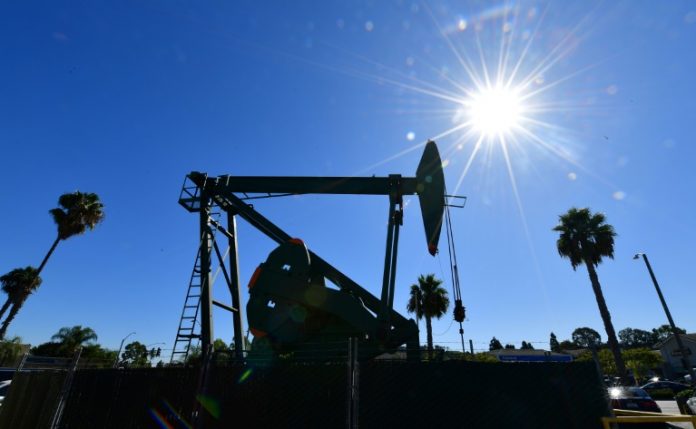Oil prices soared more than four percent Friday following news that the US had killed a top Iranian general, fanning fresh fears of a conflict in the crude-rich region.
The head of Iran’s Quds Force, Qasem Soleimani, was hit in an attack on Baghdad’s international airport early Friday, according to Hased, a powerful Iraqi paramilitary force linked to Tehran.
Later, Donald Trump tweeted a picture of the American flag, and the Pentagon said he had ordered Soleimani’s killing.
Brent surged 4.4 percent to $69.16 and WTI jumped 4.3 percent to $63.84 as investors grow increasingly worried about the effects of a possible flare-up in the tinderbox Middle East on supplies of the commodity. Both contracts later pared the gains but remained well up.
“This is more than just bloodying Iran’s nose,” said AxiTrader’s Stephen Innes. “This is an aggressive show of force and an outright provocation that could trigger another Middle East war.”
The killing of Soleimani is a dramatic escalation of tensions between the United States and Iran and comes after a pro-Iran mob this week laid siege to the US embassy in Iraq following deadly American air strikes on the hardline Hashed faction.
The attack on the embassy highlighted new strains in the US-Iraqi relationship, which officials from both countries have described to AFP as the “coldest” in years.
Oil prices saw a record surge in September after attacks on two Saudi Arabian facilities briefly slashed output in the world’s top exporter by half, with Trump blaming Iran for the attack and previous other blasts on tankers in the Gulf last year.
The crisis also comes as tensions between the US and North Korea worsen, with Kim Jong Un declaring a self-imposed moratorium on nuclear and intercontinental ballistic missile tests had ended, with US talks going nowhere.
“We are waking up to a less safe world than it was only hours ago, especially if we combine this with simmering tension in the Korean peninsula,” Innes added.
The drama sent investors rushing for the hills and safe-haven units rallied with the yen up 0.7 percent against the dollar and gold climbing more than one percent.
High-risk currencies retreated against the greenback, with South Korea’s won down 0.6 percent, Australia’s dollar down 0.4 percent and the South African rand down more than one percent.
Equities were mixed, having been enjoying the second day of the year rallying on trade optimism.
Hong Kong fell 0.2 percent by the break, while Shanghai shed 0.3 percent. Singapore retreated 0.5 percent and Taipei dropped with Mumbai. But Seoul, Sydney, Wellington, and Manila were in positive territory.
Markets had all been well up before news of the strike, thanks to ongoing optimism fuelled by the China-US trade agreement, looser central bank monetary policies and easing Brexit worries.
– Key figures around 0410 GMT –
Hong Kong – Hang Seng: DOWN 0.2 percent at 28,495.11 (break)
Shanghai – Composite: DOWN 0.3 percent at 3,076.01 (break)
Tokyo – Nikkei 225: Closed for a public holiday
Pound/dollar: DOWN at $1.3132 from $1.3139 at 2200 GMT
Euro/pound: UP at 85.08 pence from 85.02 pence
Euro/dollar: UP at $1.1175 from $1.1172
Dollar/yen: DOWN at 108.12 from 108.54 yen
Brent Crude: UP $1.89 at $68.14 per barrel
West Texas Intermediate: UP $1.62 at $62.80 per barrel
New York – Dow: UP 1.2 percent at 28,868.80 (close)
London – FTSE 100: UP 0.8 percent at 7,604.30 (close)
















